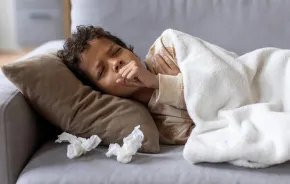 Heather Rader, a mother of three and a teacher and school librarian for over a decade for grades K-5, says that every elementary-age child can use better organizational skills. And as a parent, Rader admits she still faces the challenge herself.
Heather Rader, a mother of three and a teacher and school librarian for over a decade for grades K-5, says that every elementary-age child can use better organizational skills. And as a parent, Rader admits she still faces the challenge herself.
"Most kids go through phases of being disorganized," Rader says. "My husband and I have had to attach notes to backpacks that the kids write to themselves: Get Homework. We've also had to drive back to school at 4 p.m. when the notes didn't work. Recently my son was empty-handed at a potluck because he told me about it on the way to school, but this was a great opportunity for me to reflect on what I believe and what we are doing to make it work."
And when it comes to teaching children to be organized, it's never too early to start, she adds. "Parents can help by asking questions like, 'Where are we going? What do you need?' I do this routine with my first- and third-grader every morning. They list off: backpack, lunch box, homework and coat. Most of the time we make it to school with everything. We've made picture lists and one year we sang a song of all the thing we needed to take," Rader says.
Teachers and librarians also can be excellent instructors in getting organized, she advises. "Teachers can help by teaching the expectation and reinforcing it," she says. "Kids don't know what a desk should look like or how to make sure they always have a sharp pencil. Rhythms and routines help. Repeating simple tasks helps. For instance, checking a mailbox may not be mastered for several weeks."
Michele Hernandez is a mother, president of Hernandez College Consulting and the author of several books including The Middle Years: Achieving the Best Education for Your Child Grades 5-8. For younger children in first and second grade, Hernandez says, "students that young don't really have super-defined skills yet. I think it's enough to have some basic idea of what belongs to them versus to others, as in don't forget to bring your jacket, and basic sorting skills that can be practiced in games and other fun activities."
Parents of children this age who are chronically disorganized shouldn't worry too much, she says, adding that "many brilliant people -- like Einstein, for example -- were horrible at organizational tasks." For younger children, it is "more important to let them be exuberant about life and not fret the small stuff," she says.
By fifth grade, children's organizational skills should be growing. For those who are still very disorganized, parents may need to intervene, Hernandez advises. "Many very smart kids are disorganized, but at some point they need to learn to compensate and most of these organizational skills can be taught through daily repetition and patterns of everyday behavior," she says. "If you made your fifth-grader grader pick out clothes and lay them out every night for a whole year, I'm sure he'd learn the skill. Same with homework, putting toys away, cleaning up, etc. Parents who are on their students' cases a bit tend to help even naturally disorganized kids pull their act together enough to survive."
With the rise in the number of two-income families, being organized and responsible at home as well as school has become increasingly important for children ages 6-10. Hernandez says that deciding an appropriate amount of responsibility for a child to handle at home "depends upon a child's maturity. I've seen 6-year-olds who could do almost anything and 10-year-olds who couldn't push the 'on' button on the dishwasher."
Modeling good organizational skills is one of the keys to success, she adds. "I think parents need to include their kids in what they do and model the behavior they look for. If you keep your room clean and organized, it doesn't look hypocritical to ask your kids to do the same," she says.
Kathleen F. Miller is a Sammamish-based freelance writer and mother of two.











